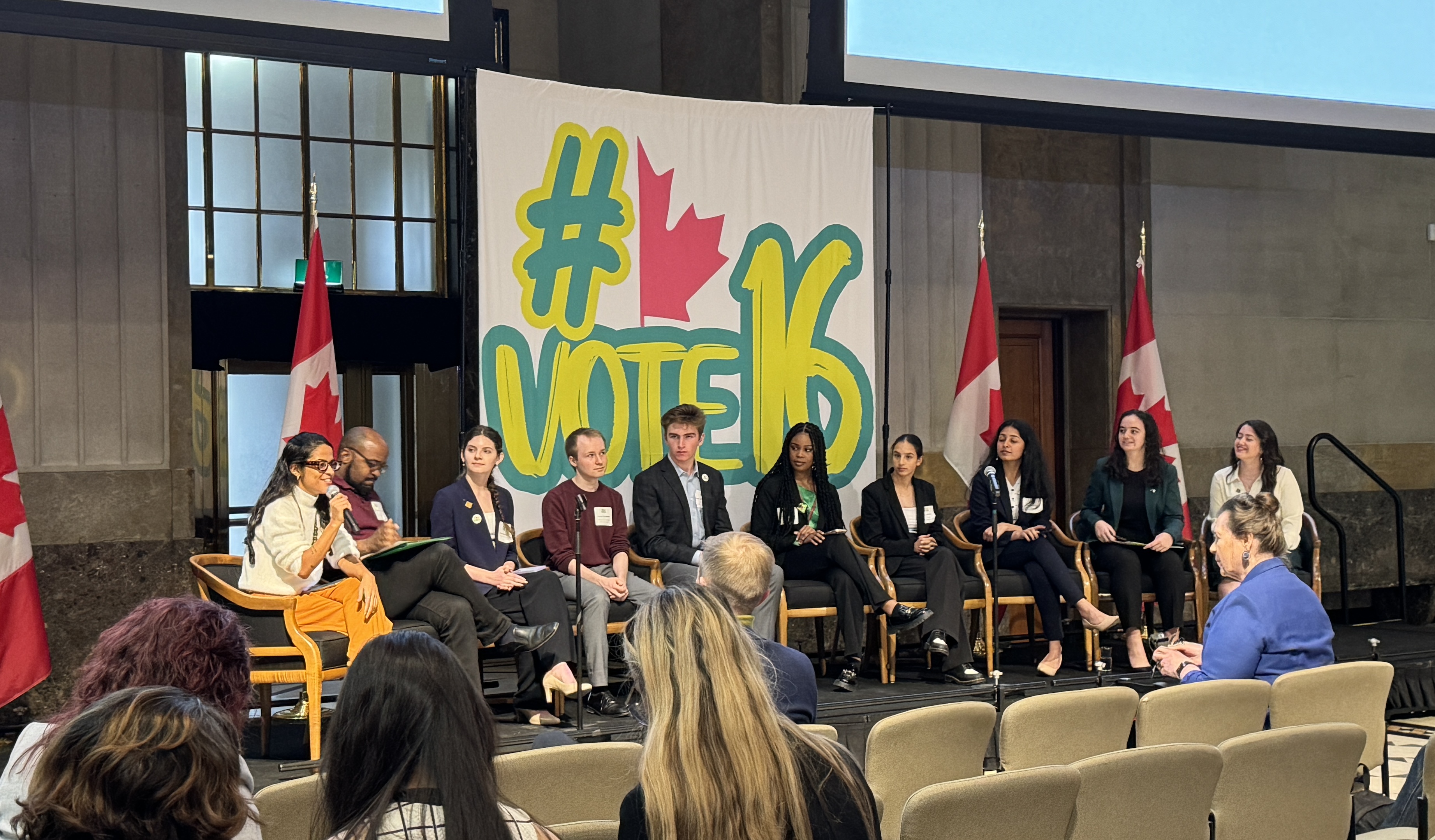 By Vlad Mirel and Kate Shackleton
By Vlad Mirel and Kate Shackleton
On May 29, 2024, academics, parliamentarians, and youth activists from across the globe gathered in Ottawa for Canada’s first-ever national Vote16 Summit. The event was organized by Vote16 Canada – a national campaign dedicated to lowering the voting age to 16 – and hosted by Senator Marilou McPhedran.
To kick off the event, numerous experts presented evidence in favour of lowering the voting age to 16. Panelist Samantha Reusch (Executive Director, Apathy is Boring) stressed that the declining civic engagement Canada is experiencing presents a direct threat to the efficacy of its democracy. She emphasized that although youth feel alienated from the democratic process, they remain interested in politics. Sabreena Delhon illustrated how the pandemic negatively impacted civic engagement by removing students from schools and thus reducing their interaction with civic education. Lastly, Dr. Jan Eichhorn (Senior Lecturer/Research Director, University of Edinburgh) spoke about Scotland’s experience with lowering the voting age to 16, highlighting that Scottish youth became more politically-engaged than their UK peers who were not enfranchised.
In the subsequent Q&A session, the panelists addressed audience concerns about social media and misinformation along with the partisan dimension of the voting age debate. The panelists expressed that many of the concerns that social media may unduly influence youth voting are already true for older generations. Furthermore, Professor Eichhorn outlined the non-partisan nature of the lowered voting age in Germany.
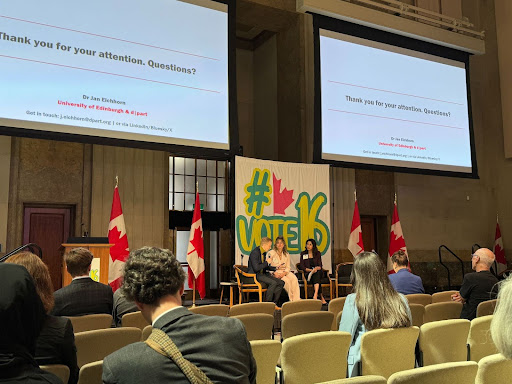
Dr. Jan Eichhorn, Samantha Reusch, and Sabreena Delhon answer audience questions
Next up was the “Vote16 in Court” panel, featuring Sage Garrett and Caeden Tipler from Make It 16 New Zealand, Jacob Colatosti and Catherine He, who are two of the youth litigants involved in the ongoing voting age Charter challenge, and the Asper Centre’s Executive Director Cheryl Milne.
Garrett and Tipler shared how Make It 16 New Zealand challenged the voting age based on the New Zealand Bill of Rights, which prohibits age discrimination against persons 16 years of age and older. They took their case all the way up to the Supreme Court, where the court held that the voting age was indeed inconsistent with the Bill of Rights. Although New Zealand’s parliamentary supremacy means that the government is not bound by the Court’s decision, Garrett and Tipler underscored that the case played a major role in raising awareness about their campaign.
Next, Milne provided an update on the Canadian Charter challenge (led by the Asper Centre and Justice for Children and Youth). She explained that the government’s evidence has been reviewed and preparations for cross-examinations are underway. Colatosti and He also described how they got involved in the case and why youth voting is important to them. Colatosti was motivated to join the case when he was 16 due to his dissatisfaction with the rate of reform within Canadian politics. Meanwhile, He – who joined the litigation at 15 – voiced her support for enfranchising youth based on their position as “citizens, driving the future of change.”
All five panelists then answered questions from the audience and noted some of the frequent questions they face. The panelists pointed out that Canada’s political cycle often results in the minimum voting age differing from when people actually get their first voting opportunity, with 19-year-old Colatosti still waiting to cast his first vote. In response to concerns that youth are too extreme or radical to vote, Garrrett stressed that no one should ever be disenfranchised based on their political opinions. Colatosti and He emphasized that parental influence is also not a persuasive counterargument, observing that youth are equally capable of influencing their parents.

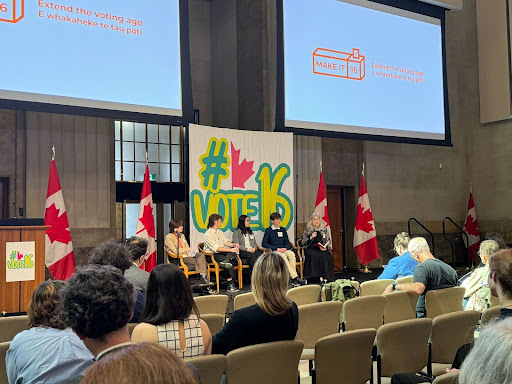
Panelists Caeden Tipler, Sage Garrett, Catherine He, Jacob Colatosti, and Cheryl Milne discuss the court challenges in New Zealand and Canada
The final panel – “Building Our Movement” – was composed of youth activists from across Canada (from various Vote16 chapters, the Fédération de la jeunesse franco-ontarienne, and the Francophone Youth Council) and international advocates like Bethania Lima from Brazil and Dr. Andrew Wilkes, who is the Chief Policy & Advocacy Officer of Generation Citizen in New York. The speakers encouraged those interested in advocating for legislative change to focus on drawing attention to their campaign and to reach out to local politicians.

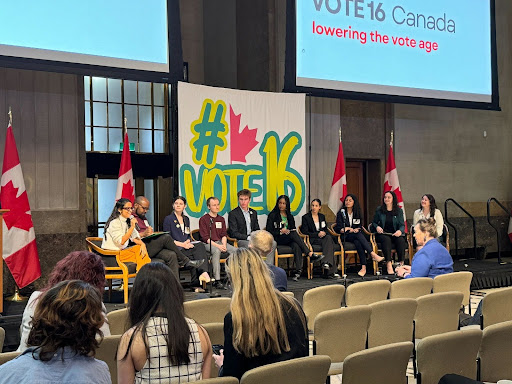

Bethania Lima (at far left) discusses how Brazil increased youth voter registration for the 2022 election
The Summit concluded with a symposium of more than 25 speakers who gave concise presentations on why they believed youth should be able to vote. Elder Verna McGregor welcomed the attendees. She analogized her dreamcatcher’s interwoven net to society itself, emphasizing how we are all interconnected and thus every voice must be heard in elections. Several parliamentarians then expressed their support for lowering the voting age, such as Senators Robert Black, Kim Pate and Bernadette Clement as well as MPs Elizabeth May and Taylor Bachrach. Notably, Bachrach credited the youth litigants in the Charter challenge with inspiring the Private Member’s Bill to lower the voting age that he brought forward in 2021. MP Yves Perron of the Bloc-Quebecois outlined the important habit-forming impact voting at 16 would have. He stressed that youth voting is important not just for young people, but for the overall health of our democracy. Katie Yu and Amelia Penney-Crocker spoke on behalf of the youth litigants, with Yu commenting that lowering the voting age is about “treating young people as people.”
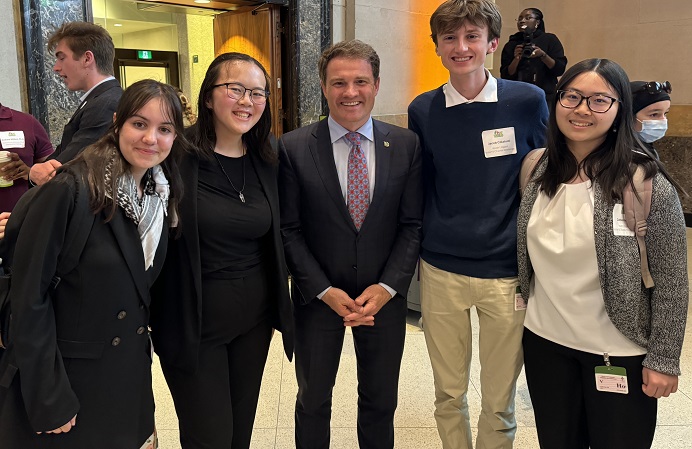
MP Bachrach with the youth litigants (from left to right: Amelia Penney-Crocker, Katie Yu, Jacob Colatosti, and Catherine He)
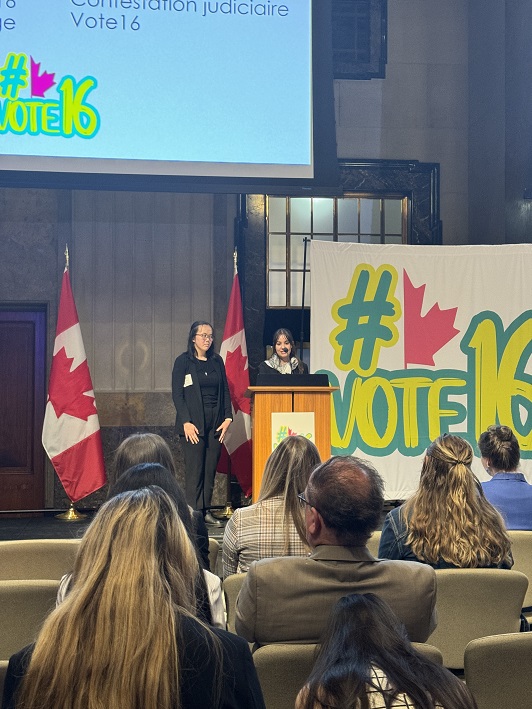
Katie Yu and Amelia Penney-Crocker speak during the symposium portion of the Summit
Overall, the Vote16 Summit was an informative and inspiring event that promises to make important contributions to the movement for extending the vote to young people. By bringing together this diverse group of people with differing lived experiences and expertise, the Vote16 Summit provided its attendees with an incredibly enriching conversation surrounding youth voting. In addition to the ongoing Charter challenge, legislative change may be on the horizon thanks to Bill S-201 (introduced by Senator McPhedran). The bill is expected to go to Second Reading in the Senate in the near future, and to ensure the bill passes, interested individuals and organizations are encouraged to contact their provincial senators to express their support. A list of senators for each province as well as a statement in support of S-201 can be found on the Vote16 website.
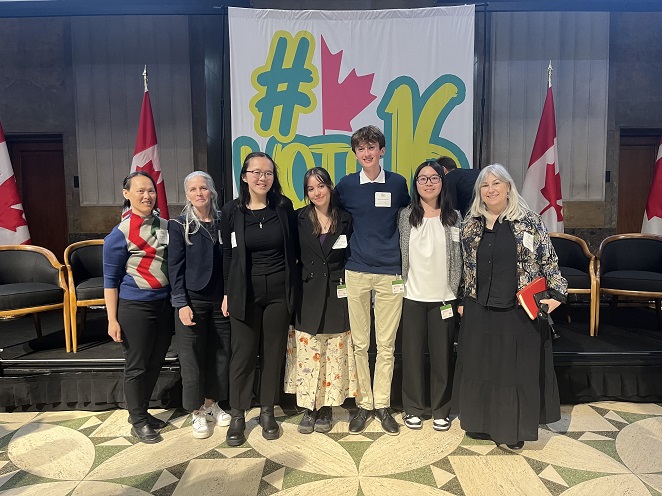
Emily Chan (Lawyer, Justice for Children and Youth), Mary Birdsell (Executive Director, Justice for Children and Youth), Katie Yu, Amelia Penney-Crocker, Jacob Colatosti, Catherine He (Youth Litigants), and Cheryl Milne (Executive Director, Asper Centre)
Vlad Mirel and Kate Shackleton are rising 2L students at the Faculty of Law and are the current Summer Research Assistants at the Asper Centre.






